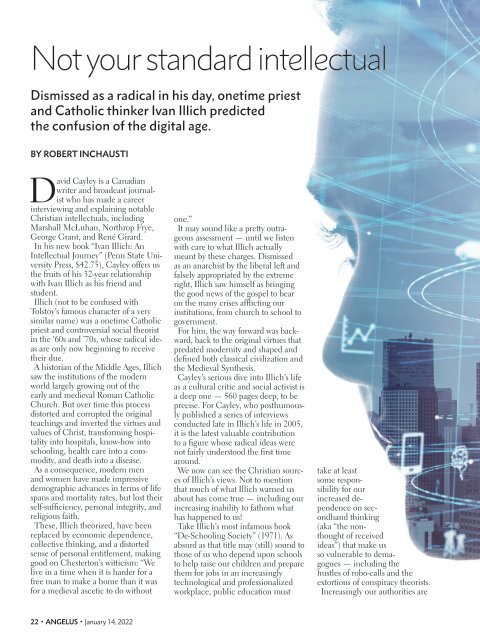Angelus News | January 14, 2022 | Vol. 7 No. 1
On the cover: It can be described as the sacrament of “penance,” “reconciliation,” or more simply, just “confession.” A necessary part of any serious Catholic’s spiritual life, certainly, but can it be something more? On Page 10, Mike Aquilina invokes the life and example of St. Pope John Paul II to make the case that confession is much more than a duty, but actually a right — and perhaps our best shot at the radical conversion God wants to give us.
On the cover: It can be described as the sacrament of “penance,” “reconciliation,” or more simply, just “confession.” A necessary part of any serious Catholic’s spiritual life, certainly, but can it be something more? On Page 10, Mike Aquilina invokes the life and example of St. Pope John Paul II to make the case that confession is much more than a duty, but actually a right — and perhaps our best shot at the radical conversion God wants to give us.
Create successful ePaper yourself
Turn your PDF publications into a flip-book with our unique Google optimized e-Paper software.
<strong>No</strong>t your standard intellectual<br />
Dismissed as a radical in his day, onetime priest<br />
and Catholic thinker Ivan Illich predicted<br />
the confusion of the digital age.<br />
BY ROBERT INCHAUSTI<br />
David Cayley is a Canadian<br />
writer and broadcast journalist<br />
who has made a career<br />
interviewing and explaining notable<br />
Christian intellectuals, including<br />
Marshall McLuhan, <strong>No</strong>rthrop Frye,<br />
George Grant, and René Girard.<br />
In his new book “Ivan Illich: An<br />
Intellectual Journey” (Penn State University<br />
Press, $42.75), Cayley offers us<br />
the fruits of his 32-year relationship<br />
with Ivan Illich as his friend and<br />
student.<br />
Illich (not to be confused with<br />
Tolstoy’s famous character of a very<br />
similar name) was a onetime Catholic<br />
priest and controversial social theorist<br />
in the ’60s and ’70s, whose radical ideas<br />
are only now beginning to receive<br />
their due.<br />
A historian of the Middle Ages, Illich<br />
saw the institutions of the modern<br />
world largely growing out of the<br />
early and medieval Roman Catholic<br />
Church. But over time this process<br />
distorted and corrupted the original<br />
teachings and inverted the virtues and<br />
values of Christ, transforming hospitality<br />
into hospitals, know-how into<br />
schooling, health care into a commodity,<br />
and death into a disease.<br />
As a consequence, modern men<br />
and women have made impressive<br />
demographic advances in terms of life<br />
spans and mortality rates, but lost their<br />
self-sufficiency, personal integrity, and<br />
religious faith.<br />
These, Illich theorized, have been<br />
replaced by economic dependence,<br />
collective thinking, and a distorted<br />
sense of personal entitlement, making<br />
good on Chesterton’s witticism: “We<br />
live in a time when it is harder for a<br />
free man to make a home than it was<br />
for a medieval ascetic to do without<br />
one.”<br />
It may sound like a pretty outrageous<br />
assessment — until we listen<br />
with care to what Illich actually<br />
meant by these charges. Dismissed<br />
as an anarchist by the liberal left and<br />
falsely appropriated by the extreme<br />
right, Illich saw himself as bringing<br />
the good news of the gospel to bear<br />
on the many crises afflicting our<br />
institutions, from church to school to<br />
government.<br />
For him, the way forward was backward,<br />
back to the original virtues that<br />
predated modernity and shaped and<br />
defined both classical civilization and<br />
the Medieval Synthesis.<br />
Cayley’s serious dive into Illich’s life<br />
as a cultural critic and social activist is<br />
a deep one — 560 pages deep, to be<br />
precise. For Cayley, who posthumously<br />
published a series of interviews<br />
conducted late in Illich’s life in 2005,<br />
it is the latest valuable contribution<br />
to a figure whose radical ideas were<br />
not fairly understood the first time<br />
around.<br />
We now can see the Christian sources<br />
of Illich’s views. <strong>No</strong>t to mention<br />
that much of what Illich warned us<br />
about has come true — including our<br />
increasing inability to fathom what<br />
has happened to us!<br />
Take Illich’s most infamous book<br />
“De-Schooling Society” (1971). As<br />
absurd as that title may (still) sound to<br />
those of us who depend upon schools<br />
to help raise our children and prepare<br />
them for jobs in an increasingly<br />
technological and professionalized<br />
workplace, public education must<br />
take at least<br />
some responsibility<br />
for our<br />
increased dependence<br />
on secondhand<br />
thinking<br />
(aka “the nonthought<br />
of received<br />
ideas”) that make us<br />
so vulnerable to demagogues<br />
— including the<br />
hustles of robo-calls and the<br />
extortions of conspiracy theorists.<br />
Increasingly our authorities are<br />
22 • ANGELUS • <strong>January</strong> <strong>14</strong>, <strong>2022</strong>


















